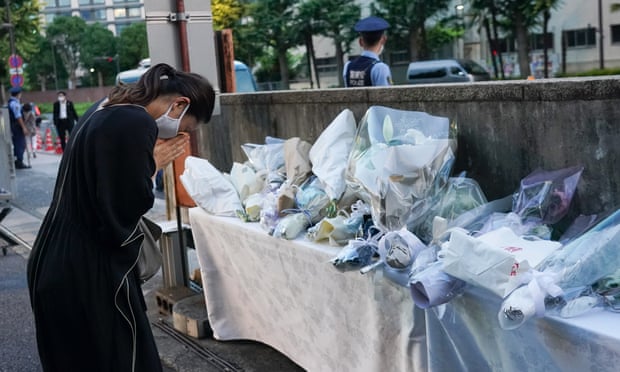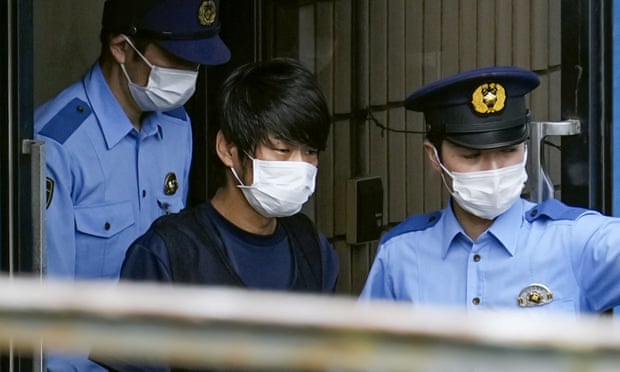Japan’s ruling party has won a comfortable victory in elections overshadowed by the assassination of the former prime minister, Shinzo Abe.
Exit polls showed that the Liberal Democratic party (LDP), which Abe led until he resigned in 2020, had secured more than half the 125 seats being contested in the 248-seat upper house.
The LDP and its junior coalition partner, Komeito, were projected to win more than 63 seats, according to a Kyodo news agency exit poll. The public broadcaster NHK said the parties would win between 69 and 83 seats.
The coalition needed to secure 55 seats to retain their majority in the upper house – the less powerful chamber in Japan’s parliament.
“It’s significant we were able to pull this election together at a time violence was shaking the foundations of the election,” the prime minister, Fumio Kishida, an Abe protege, said after the exit poll.
The party had expected to perform well before Abe, Japan’s longest-serving prime minister, was shot dead by a gunman as he delivered a campaign speech in the western city of Nara on Friday morning.
While the official result has yet to be declared, experts said Abe’s violent death, at 67, could boost turnout and support for his party.

Kei Sato, the LDP candidate Abe had been campaigning for when he was killed, said: “Former prime minister Abe, who came to support me, was shot in an act of terrorism in the midst of our election campaign.
“But we continued our campaign in the belief that we must not cave in to terrorism or fear it – we must overcome it. I hope to travel to Tokyo tomorrow to tell former Prime Minister Abe himself of this victory,” added Sato, who was projected to win his seat.
Japanese government officials had urged people to vote to demonstrate the country’s refusal to be intimidated by violence, while newspaper editorials blasted Abe’s killing, carried out with a homemade shotgun, as an attack on democracy.
“We must never allow violence to suppress speech during elections, which are the foundation of democracy,” Kishida, said during a campaign speech on the eve of the vote.
The run-up to the election had been dominated by rising prices, energy shortages and security threats, including LDP plans to double defence spending to at least 2% of GDP in the face of a nuclear-armed North Korea and more assertive China.
The vote was being seen as a referendum on Kishida’s first 10 months in office; control of the government, which is decided in the lower house, was not at stake.
The poll, though, was overshadowed by Abe’s death, and growing questions over his security arrangements and the motives of his alleged killer.

The suspect, Tetsuya Yamagami, has told police that he had originally intended to target the leader of a religious group to which his mother had made a “huge donation” that led to her bankruptcy. He reportedly admitted he had also wanted to kill Abe, whom he accused of having ties to the group.
Japanese newspaper and broadcasters have not named the organisation, but some Japanese media reports identified the group as the Unification Church, whose members are commonly derided as “Moonies”.
NHK said Yamagami had spent months planning the attack, having started by building explosives before deciding to construct “multiple” guns using skills he had learned during his three years in the maritime self-defence force.
Two days after Abe was gunned down in front of a railway station while addressing a small crowd, there was incredulity over how Yamagami, a 41-year-old resident of Nara, had managed to move freely behind Abe and fire two shots from close range before being wrestled to the ground by security officials.
On Saturday, the head of the Nara prefectural police force admitted security arrangements had been flawed and promised a thorough investigation into the lapse.
“I believe it is undeniable that there were problems with the guarding and safety measures for former prime minister Abe,” Tomoaki Onizuka told reporters.
“In all the years since I became a police officer in 1995 … there is no greater remorse, no bigger regret than this.”
Police numbers were noticeably high when Kishida appeared at a campaign event in a city south-west of Tokyo on Saturday, with attendees required to pass through a metal detection scanner – an unusual security measure in Japan.
The LDP’s victory has cleared the path for a “golden” three years in which Kishida, who has promised to build a “new capitalism”, will not have to face an election.
Some analysts said a particularly strong showing could even spur him to revise Japan’s “pacifist” constitution – a controversial measure that Abe, its most vocal champion, never realised due to lack of public support.
“In the months ahead, the government is certain to seek to strengthen domestic security,” said James Brady, a Japan analyst at the US-based Teneo consultancy. “By undermining the public’s general sense of safety and order, the event could also add further momentum to those key Abe causes like defence build-up and constitutional revision.”
Miu Komuro, who voted for the LDP in an eastern Tokyo constituency, said: “I wanted to vote for a party that has been stably in power.”
But Yuko Takeuchi, 52, a nurse in Tokyo who voted for the Japanese Communist party, said: “Of course, I am very sorry for his death, but this election must be separated from that.”
Attention will soon turn to Abe’s funeral, which will be held for family and close colleagues only at Zojoji temple in central Tokyo on Tuesday following a wake the previous night. As yet, no plans have been announced for a public memorial.
The US secretary of state, Antony Blinken, will visit Japan on Monday to offer his condolences, the state department said.
“The alliance between Japan and the United States has been a cornerstone of our foreign policy for decades,” Blinken said Saturday after G20 talks in Bali.
“Prime Minister Abe really brought that partnership to new heights. The friendship between the Japanese and American people is likewise unshakable. So we’re standing with the people of Japan, with the prime minister’s family, in the aftermath of a truly, truly appalling act of violence.”


Comments